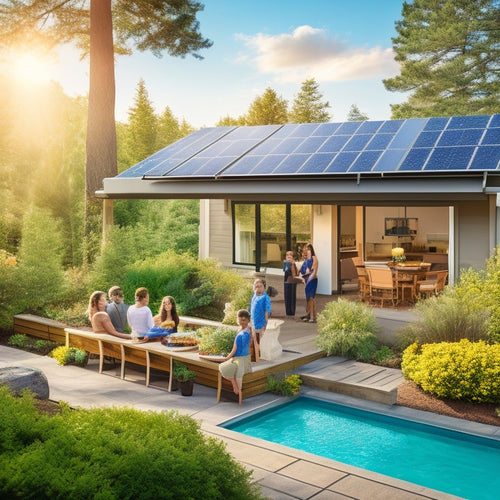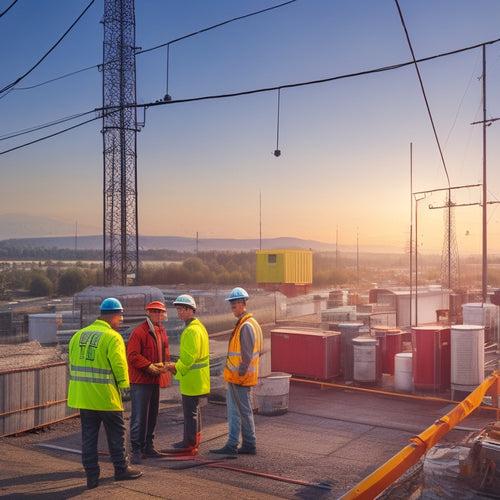
House Battery Backup System
Share
You're considering a house battery backup system to guarantee reliable power during outages. This system seamlessly shifts to battery power, maintaining vital loads like refrigeration and lighting, and protecting sensitive electronics from surges and data loss. Deep cycle batteries, designed for repeated charging and discharging, are an important component, and proper maintenance is necessary to extend their lifespan. To get started, you'll need to calculate your power needs, selecting the right battery type and configuration for your essential appliances. By understanding the system components and maintenance requirements, you'll be well on your way to a reliable backup system that provides peace of mind during grid failures – and there's more to investigate about optimizing your system's performance.
The Essentials
- A house battery backup system provides reliable power during outages, ensuring essential appliances remain operational and protecting against power surges and data loss.
- The system seamlessly transitions to battery power upon grid failure, maintaining critical systems like refrigeration and lighting.
- Deep cycle batteries are designed to withstand repeated charging and discharging demands, offering 3,000 to 5,000 charge cycles with proper maintenance.
- Calculating power needs involves identifying essential system components, estimating power usage, and choosing the right battery type and configuration.
- Regular maintenance, including inspections and cleaning, is crucial to ensure system performance, extend battery lifespan, and reduce downtime.
Reliable Power During Outages
You expect your house battery backup system to provide power when you need it most - during outages.
With a reliable system, you're guaranteed outage protection, ensuring your essential appliances remain operational.
By investing in a high-quality backup system, you'll have peace of mind knowing you'll stay powered up even when the grid goes down.
A reliable battery backup for home also protects sensitive electronics from damaging power surges and data loss Home Energy Storage, and keeps critical systems like refrigeration and lighting running smoothly.
Power When You Need
During extended outages, a house battery backup system guarantees reliable power supply to critical loads, providing a seamless shift from grid power to backup power. You can rest assured that your essential appliances, such as refrigerators, lights, and medical equipment, will continue to function without interruption. This means you'll have the power you need to stay safe, comfortable, and connected during an outage.
With a backup power solution like Emergency Power Backup, you can protect your family and home from the inconvenience and safety concerns of power outages. Furthermore, a house battery backup system also prevents costly losses due to food spoilage and damage to electronics.
With a house battery backup system, you're not at the mercy of the grid. You have control over your energy supply, ensuring that you can keep your home running smoothly even when the grid fails. This level of energy independence is especially important for those who rely on critical medical equipment or have limited mobility.
The system's solar integration capabilities allow you to utilize the power of the sun to recharge your batteries, further reducing your reliance on the grid. This means you can enjoy the freedom to live life on your own terms, without worrying about power outages disrupting your daily routine.
With a house battery backup system, you'll have the reliable power you need to stay in control, even when the grid lets you down.
Outage Protection Guaranteed
A house battery backup system's primary function is to provide outage protection guaranteed, making certain that your critical loads remain powered when the grid fails. This means you can rest assured that your essential appliances, such as refrigerators, medical equipment, and communication devices, will continue to operate even during extended power outages.
By integrating a battery backup system with your solar panel investment, you can maximize solar energy and reduce your reliance on the grid. Additionally, a house battery backup system allows you to optimize your energy consumption, reducing your energy costs and contributing to a more sustainable living experience.
When developing outage preparedness strategies, it's important to reflect on the significance of reliable power during emergencies. A house battery backup system is a key component of your emergency power plans, providing a seamless shift to backup power in the event of a grid failure.
By integrating a battery backup system into your home, you can guarantee that your critical loads remain powered, even when the grid is down.
With a house battery backup system, you're not only protected from power outages but also from the uncertainty and disruption they can cause. By having a reliable source of power, you can maintain your independence and freedom, even in the face of unexpected events.
Seamless Transition to Power
You need a seamless changeover to power during outages, which is why your house battery backup system is designed to provide power on demand.
This means you'll experience instant switchover assurance, ensuring that your critical appliances remain operational without interruption.
Many residential energy storage solutions, such as Powerwall, provide this capability.
With renewable energy storage systems, you can store excess energy generated by your solar panels for later use.
With this capability, you can rest assured that your backup system will automatically switch to battery power the moment the grid fails.
Power On Demand
The instantaneous power backup capability of a house battery backup system relies on its Power On Demand feature, which guarantees a seamless shift to power in the event of an outage. This feature enables you to enjoy uninterrupted power supply, assuring that your appliances and devices continue to function without any disruptions.
With Power On Demand, you can rest confident that your energy independence is maintained, even when the grid fails.
The system's advanced technology detects power outages in real-time, instantly switching to backup power to bridge the gap. This instantaneous response ensures that your home remains powered, without any noticeable interruption.
As a result, you can continue to live sustainably, without compromising on your energy needs. The Power On Demand feature is particularly useful for homes with critical loads, such as medical equipment or refrigeration systems, where even a brief power outage can have serious consequences.
Instant Switchover Assurance
In accordance with grid outage scenarios, instant switchover reliability is a vital component of a house battery backup system, guaranteeing that your home shifts seamlessly to backup power. This feature assures that when the grid goes down, your backup system kicks in instantly, providing uninterrupted power to your essential appliances and devices.
With instant switchover reliability, you won't experience even a flicker of downtime, guaranteeing your safety, comfort, and convenience remain uncompromised.
Instant power is essential in emergency situations, and a reliable backup system must be able to provide it. The instant switchover reliability feature guarantees that your backup power system is always ready to take over, providing backup reliability that you can count on.
This means you'll have continuous power to your critical loads, such as refrigeration, lighting, and communication devices, even when the grid is down.
Deep Cycle Battery Technology
You're likely familiar with the significance of cycle life expectancy in deep cycle batteries, which directly impacts your house battery backup system's overall performance.
A reliable off grid solar system requires a well-maintained deep cycle battery to guarantee continuous power during outages and nights.
Proper maintenance is vital to extending this lifespan, and you'll want to know the essential tips to keep your batteries in top condition.
Cycle Life Expectancy
About 3,000 to 5,000 charge cycles can be expected from a high-quality deep cycle battery, a benchmark that highlights the impressive durability of this technology. This means you can rely on your house battery backup system to provide power for years to come, even in areas prone to frequent outages.
When you invest in a deep cycle battery, you're getting a system that's designed to withstand the demands of repeated charging and discharging.
As you use your battery, you'll notice a gradual decline in its capacity over time. This is known as battery degradation, a natural process that affects all deep cycle batteries.
However, high-quality batteries are engineered to minimize this effect, ensuring you get the most out of your investment. Factors like temperature, charge rate, and depth of discharge all impact cycle longevity.
Battery Maintenance Tips
Take charge of your deep cycle battery's performance by staying on top of routine maintenance tasks. Proper battery maintenance is essential to guarantee your house battery backup system operates efficiently and prolongs its lifespan.
You should regularly check the battery's state of charge, voltage, and temperature to identify any potential issues. When it comes to battery charging, make certain to follow the manufacturer's charging protocol to avoid overcharging or undercharging, which can greatly reduce the battery's lifespan.
Additionally, confirm proper battery storage by keeping the battery in a well-ventilated area, away from extreme temperatures and physical damage. You should also perform periodic equalization charges to prevent sulfate buildup and maintain the battery's overall health.
Calculate Your Power Needs
You'll need to identify the essential system components that will be powered by your house battery backup system to accurately calculate your power needs.
Estimating power usage requires a thorough understanding of the electrical loads that will be supported during an outage. In today's market, top-rated battery storage systems like residential energy storage systems are designed to provide energy independence and backup power during outages.
Essential System Components
Designing a house battery backup system begins with calculating your power needs, an essential step that determines the system's overall performance and reliability.
You'll need to choose the right battery type, taking into account factors like depth of discharge, cycle life, and charging speed. Two popular options are lead-acid and lithium-ion batteries, each with their own strengths and weaknesses.
When selecting batteries, you'll need to take into account the installation guidelines for your specific setup. This includes ensuring the batteries are installed in a well-ventilated area, away from flammable materials, and at the correct temperature.
You'll also need to decide on the battery configuration, such as a 12V or 48V system, and the total battery capacity required to meet your power needs.
In addition to batteries, other essential system components include an inverter/charger, a charge controller, and a monitoring system.
The inverter/charger converts DC power from the batteries to AC power for your home, while the charge controller regulates the flow of energy from your renewable energy source, such as solar panels.
A monitoring system helps you keep track of your energy production, consumption, and storage, ensuring your system operates efficiently and effectively.
Power Usage Estimation
To determine the right battery backup system for your house, calculating your power needs is a critical first step.
You'll need to assess your energy requirements to guarantee your backup system can support your essential appliances during an outage. Start by identifying the devices you want to power and their respective wattage ratings.
Consider the energy efficiency of each appliance, as this will impact your overall power consumption.
Make a list of the appliances you want to back up, including their power ratings and the number of hours you expect to use them during an outage.
Calculate the total watt-hours (Wh) required to power each appliance for the desired duration. Add up the Wh requirements to determine your total power needs.
This calculation will give you a clear understanding of the capacity and type of battery backup system you need to guarantee uninterrupted power supply during an outage.
Longer Battery Lifespan Guaranteed
You'll want to guarantee your house battery backup system operates at peak performance, and that means assuring a longer battery lifespan.
Proper maintenance is key to achieving this goal, as it prevents premature wear and tear on your batteries.
Proper Maintenance Matters
Regular inspections and timely interventions are essential to guaranteeing your house battery backup system operates at peak performance and extends its lifespan. By monitoring your system's performance, you can identify potential issues before they become major problems, saving you time and money in the long run.
Create a maintenance schedule to stay on top of tasks such as checking battery health, cleaning terminals, and verifying connection integrity.
You should also perform regular software updates to guarantee your system stays optimized and efficient. Additionally, keep your system's environment clean and cool, as high temperatures can negatively impact battery health.
By following these guidelines, you'll be able to enjoy a longer battery lifespan and reduced downtime. Remember, a well-maintained system is key to achieving true energy independence.
Frequently Asked Questions
Can I Install a House Battery Backup System Myself?
You can attempt a DIY installation, but be aware that it's essential to prioritize safety considerations, guaranteeing you're knowledgeable about electrical systems and local building codes to avoid risks and secure a successful, compliant, and safe setup.
How Long Does It Take to Fully Charge the Batteries?
When you're reliant on off-grid power, you'll want to know how long it takes to fully charge your batteries. This depends on the charging speed and battery capacity; for example, a 10kWh battery with a 3kW charger would take around 3-4 hours to fully charge.
Are There Any Maintenance Requirements for the System?
Did you know 80% of battery failures are preventable? You'll extend your battery lifespan by following a regular maintenance schedule, checking electrolyte levels, and performing equalization charges to guarantee peak performance and freedom from power outages.
Can I Use a House Battery Backup System With Solar Panels?
You can combine solar panels with a battery backup system, achieving solar integration and energy independence; this setup allows you to utilize renewable energy, store excess power, and enjoy uninterrupted electricity when the grid goes down.
Are House Battery Backup Systems Compatible With All Appliances?
You wonder if your appliances will play nice with a backup system; the answer lies in appliance compatibility and smart energy management, ensuring seamless integration and efficient power distribution, giving you the freedom to choose.
Final Thoughts
You've got a safety net against power outages with a house battery backup system. Like a calm anchor in a storm, it holds fast, providing reliable power when you need it most. With seamless changeover and long-lasting deep cycle batteries, you can weather any outage. By calculating your power needs, you'll verify your system is customized to your requirements. And with our guarantee, you can be confident your batteries will last longer, giving you peace of mind when the lights go out.
Related Posts
-

What Happens Without a Charge Controller in Solar Panels
Without a charge controller in your solar panel system, you risk overheating batteries due to overcharging, which can...
-

Top-Rated Home Solar Power Kits for Achieving Energy Independence
Top-rated home solar power kits enable you to achieve energy independence by greatly cutting your energy costs. You c...
-

Smart Grid Technology Implementation Challenges
You'll encounter several challenges when implementing smart grid technology, particularly in cost management, scalabi...


